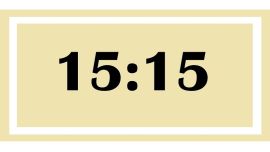Inflation accelerated slightly in June from May but remained below five percent for a second consecutive month, according to official data.
Consumer prices rose 4.6 percent in June, a rise of 0.4 points from the previous month.
It's the first time in five months that inflation has risen – while in December price hikes hit 25.5 percent, they slowed to 20.6 percent in January, 13.2 percent in February, 11 percent in March, 8.8 percent in April and 4.2 percent in May.
Inflation over the last 12 months now totals 271.5 percent, according to the INDEC national statistics bureau, which revealed prices to the punter have risen by 79.8 percent since the turn of the year.
The highest increase last month was a rise of 14.3 percent for housing, water, electricity, gas and other fuels, mainly due to hikes in rent and electricity and gas tariffs.
It was followed by restaurants and hotels (6.3 percent) and education (5.7 percent), with surges seen across all levels of education.
The two divisions with the smallest changes in June were alcoholic beverages and tobacco (2.1 percent) and household equipment and maintenance (2.3 percent).
At the category level, regulated prices (8.1 percent) led the increase, followed by seasonal (4.4 percent) and core inflation (3.7 percent).
Earlier this week, Economy Minister Luis Caputo had forecast a rate of "below five percent."
"That is the expectation and core inflation should start with three percent," said the official.
"We are in the recovery stage, we are out of intensive care," Caputo told Radio Mitre on Thursday.
According to the Central Bank's regular survey of market expectations, consumer prices are expected to rise 138 percent this year.
Consumption and economic activity have plummeted since December following a massive devaluation of the peso and strict budget cuts.
GDP fell by 5.3 percent in the first quarter of the year, the second consecutive quarterly decline.
"The significant drop in consumption explains the reduction in the inflation rate since December, to a large extent," economist Hernán Letcher, director of the Centro de Economía Política Argentina (CEPA).
Argentina's economy will contract by 2.8 percent this year, according to the International Monetary Fund (IMF), after declining 1.6 percent in 2023.
– TIMES/AFP/NA

























Comments